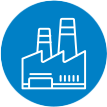Risk Management
Prudent Approach to Managing Uncertainties
In today’s rapidly evolving world, it is crucial for organisations to take a proactive approach to identifying and managing various risks they encounter or may encounter. Traditional risks as well as emerging risks, pose significant challenges to businesses. Therefore, it is imperative for organisations to stay vigilant and adapt to these risks to ensure their long-term success.
Our organisation has implemented a comprehensive and robust Risk Management Framework that is an integral part of our governance architecture. This framework is essential in driving business resilience in a VUCA (Volatile, Uncertain, Complex, Ambiguous) world. The Framework, based on the Tata Steel Group Risk Management Process, adheres to international standards such as the Committee of Sponsoring Organisations of the Treadway Commission (COSO) and ISO 31000. It is also closely aligned with our Strategic Planning and Capital Project Evaluation process.
Our Risk Identification and Treatment Process incorporates a two-tier mechanism with both, a bottom-up and top-down approach. In the bottom-up process, critical risks at the process level are identified for mitigation by each Function. Risks that impact multiple key processes or have a significant impact on profitability/Sustainability are recognised as enterprise-level risks and are addressed through the top-down or Enterprise Risk Management (ERM) Process.
We prioritise risks based on the severity of impact and the likelihood of occurrence, using a customised rating scale. Risk treatment plans are adopted for all critical (class A) and moderate (class B) risks, based on cost-benefit analysis and following the principles of acceptance, avoidance, transfer and mitigation. For low (class C) risks, contingency plans are put in place. Acceptance is an intelligent risk-taking mechanism to leverage emerging opportunities.
Financial
As a net importer, we are vulnerable to currency volatility, which could potentially harm our profitability and disrupt our business continuity, if not managed effectively.
Capitals Impacted
 Financial
Financial
Mitigation Measures
- Maintaining healthy cash flow generation
- Implemented a hedging policy
Regulatory
Our operations are significantly affected by the constantly changing regulatory landscape, particularly with regard to environmental regulations. Failure to comply with these regulations may damage our reputation and have negative consequences.
Capitals Impacted
 Financial
Financial
 Manufactured
Manufactured
 Social and
Social and
Relationship
 Natural
Natural
Mitigation Measures
- Actively tracking the regulatory landscape
- Driving technology-enabled mechanisms to track compliance, awareness, timelines with suitable escalations, action plans and reviews
- Practicing zero tolerance to non-compliance
Environmental Sustainability
There is an increasing challenge in addressing environmental Sustainability aspects, including climate risk arising from expected medium and long-term changes in regulatory and other requirements as well as for addressing other environmental Sustainability aspects including water security, circularity, ensuring air quality and having a social license to operate.
Capitals Impacted
 Financial
Financial
 Manufactured
Manufactured
 Natural
Natural
Mitigation Measures
- Implemented long-term plans for the consistent reduction of GHG emissions and eventually net zero goal
- Increased focus on the usage of renewable energy sources
- Reduce wastage of resources by enhancing material circularity and plant housekeeping
- Build dynamic contingency plans for physical risk arising from climate change scenarios such as flood, inundation
- Focus on green belt development
- Ensuring reduction in process and fugitive emissions to ensure safe ambient air quality
- Ramping up Waste Management plans for better disposal of process waste and e-waste
- Implementing efficient Water Management initiatives for water conservation and sustainable groundwater usage
Macroeconomic and Market
Foundry-grade PI is a commodity product that serves as raw material for the casting industry. On the other hand, DI Pipe is an end product that is used in the construction of water transmission infrastructure. The demand for both
Foundry-grade PI and DI Pipe is influenced by the balance between supply and demand, which can be affected by factors such as capacity addition, investment by the Government in water infrastructure and substitution by alternative products.
Capitals Impacted
 Financial
Financial
 Manufactured
Manufactured
 Social and
Social and
Relationship
Mitigation Measures
- Developing a strong Go-To-Market (GTM) strategy is our goal to become the preferred choice of customers, earn a premium over competitors and secure customer loyalty
- Strategy will involve various elements, including brand building through Tata eFee and Tata Ductura, digital marketing initiatives, technical services, CSR activities at customer sites and the use of digital technologies like CRM
Operational
Our plant operations are vulnerable to interruptions caused by various uncertainties such as machinery failures, natural disasters, epidemics or pandemics, and reliance on outsourced vendors who are responsible for managing critical operations. Any of these factors could potentially have an adverse effect on our operations.
Capitals Impacted
 Financial
Financial
 Manufactured
Manufactured
 Social and
Social and
Relationship
Mitigation Measures
- Using Daily Management and data analytics to improve plant availability and reliability
- Improving process efficiencies through technology and digital intervention
- Creating disaster recovery plan and related SOPs to proactively respond to natural disasters, epidemics, etc.
- Undertaking community welfare initiatives to encourage industrial harmony and business continuity plan to mitigate disruption of outsourced operations
Safety
Adherence to Safety laws and regulations as internal SOPs are crucial to maintaining business continuity and protecting our workforce. Non-compliance poses a risk to the health and Safety of our employees and the reputation of our Company.
Capitals Impacted
 Financial
Financial
 Manufactured
Manufactured
 Human
Human
Mitigation Measures
- Committed to zero harm via policies and initiatives
- Encouraging experiential learning and focus on awareness of Safety standards among workers and employees
- Running campaigns on various Safety topics and raising the Safety standards further through cross-functional teams
Community
Losing the trust and support of communities would undermine our efforts to make a meaningful impact on society, and ultimately jeopardise our reputation and ability to sustain our business.
Capitals Impacted
 Financial
Financial
 Manufactured
Manufactured
 Human
Human
Mitigation Measures
- Creating deep societal development based on a portfolio of programmes and platforms
- Driving CSR initiatives focused on three enablers - education, employability and essential amenities
Commodity
Volatility in raw material prices, geopolitical events, pandemics, and changing weather patterns can significantly impact our input costs by affecting commodity prices.
Capitals Impacted
 Financial
Financial
 Manufactured
Manufactured
 Social and
Social and
Relationship
Mitigation Measures
- Decreasing dependence on a single source and diversifying supply sources across geography
- Developing captive/indigenous raw materials to safeguard against volatility and supply chain disruption
Supply Chain
The supply of critical materials is vulnerable to climate disruptions, political instability, local regulations and intermittent waves of pandemics.
Capitals Impacted
 Financial
Financial
 Manufactured
Manufactured
 Social and
Social and
Relationship
Mitigation Measures
- Developing alternate materials and/or supply sources for proprietary items and single source items (country, supplier)
Cybersecurity
The rapid adoption of digital technologies in our plant operations has increased our vulnerability to cyberattacks and information Safety risks, which may impact business continuity to a large extent
Capitals Impacted
 Financial
Financial
 Manufactured
Manufactured
 Human
Human
 Intellectual
Intellectual
Mitigation Measures
- Adopted next-generation Security Operations Centre (SOC) controls and technologies for IT security
- Partnered with well-regarded and best-in-class service provider for SOC services
- Increased cybersecurity awareness programmes for employees and competency training for the IT Teams
- Ensured adequate technology governance through patch Management, data backup and compliance with advisory
- Ensuring strict adherence to change and incident Management practices as well as critical alert response